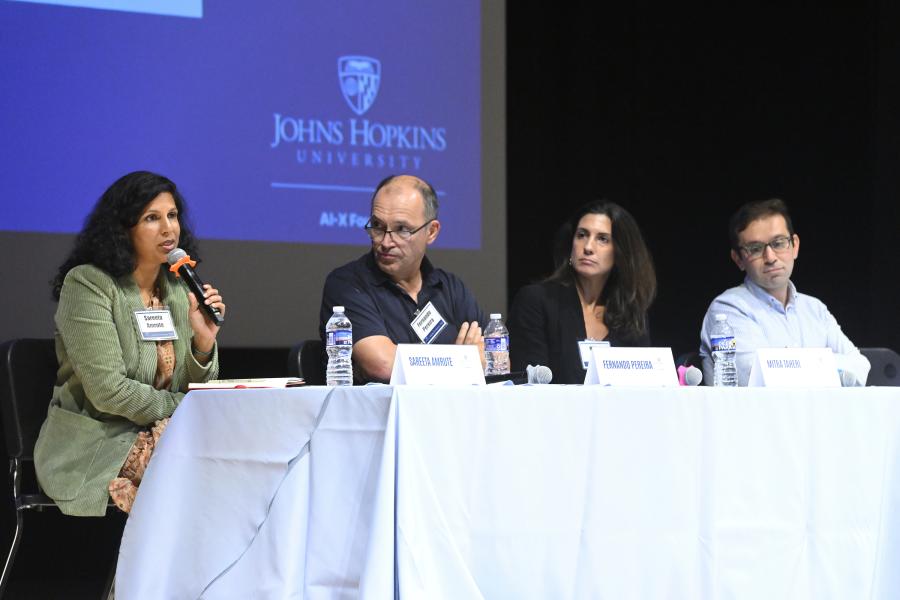Humans can fly around the world, send messages across distances in an instant, and monitor their vital signs in real-time—all thanks to technology. With data science and artificial intelligence, human capabilities will continue to broaden and evolve, and tasks that previously loomed impossible or took laborious amounts of time will become conceivable or easier to tackle, according to experts speaking at Johns Hopkins University's AI-X Foundry Fall 2023 Symposium, Charting a New Course: Navigating AI in Research Traditions.
Hosted by the university's AI-X Foundry, the day-long event in Shriver Hall featured industry leaders and researchers diving deep into aspects of AI related to a range of disciplines, from linguistics and anthropology to cognitive science, biomedical technology, and materials science.
"One of the things we face when we interact with language machines, as we do when we talk to chatbots and search engines, is that somehow the machine has to grasp what we're saying in some way and act appropriately," said Fernando Pereira, the vice president of research at Google DeepMind and former chair of the Computer and Information Science Department at the University of Pennsylvania, in the first keynote talk of the symposium. "It has to grasp the meaning, more or less … and this is a big challenge for all computational approaches for language."
Earlier approaches to computational language and chatbots stemmed from the research of linguist Noam Chomsky, who postulated that natural language is based on an innate understanding of universal rules of grammar and syntax, Pereira explained. Words, then, served distinct functions, such as noun or verb, and in computer language, those functions served as symbols. "That's sort of how most of us in AI used to think … that underneath natural language we have logical structures, where different parts have logical relationships with each other," he said.
But this mindset turned out to be shortsighted. "We were defeated [in this approach] because language use is a lot wilder, more variable, more unexpected, difficult to characterize by a small number of formal rules than we thought," Pereira said, alluding to the breakthrough that occurred with Google's publication of the paper "Attention Is All You Need", in 2017, on natural language processing. Large language models, the paper argues, derive their power not from innate logical ability but from vacuuming up billions of examples "from our collective linguistic experience," Pereira explained, captured in the countless stream of words on the Internet.
"[The new AI technology] blows my mind," he said. "If you take a hole punch and take out one word in a sentence, this technology can very accurately guess the missing word. As a predictive and generative model, it can also guess the next most likely word and even compose entire compositions."
Despite these advancements, the technology is "brittle … and can't do logic, … and if you change a seemingly unimportant word in your query, the model comes back with a different result," he warned. The philosophical question to ponder, however, as we move forward with AI, is whether to conceive of language and reasoning not as a natural phenomenon but rather "as a construction of human social endeavor," he said.
Other keynote speakers at the symposium were Sareeta Amrute, an anthropologist and associate professor of Strategic Design and Management at Parsons, The New School, and Mitra Taheri, a professor in the Department of Materials Science and Engineering and the director of the Materials Characterization and Processing facility at Johns Hopkins. While Amrute presented alternatives to the hegemonic narrative frames driving research on AI, Taheri delved into the role of machine learning in materials science—and its potential to help crack the code on pressing real-world problems.
"AI systems often seem detached from social life, but they're in fact very much a product of sociology, sociality, the labor assumptions and practices of humans, and, more, the human lives with which they interact," Amrute said.
For this reason, "we need to ask who is not yet seated at the table … and who is not even yet in the room," Amrute continued, referring to the indigenous and marginalized communities she believes are left out of the world's efforts to develop and advance AI. "What can we do to shift our [dominant] frames of reference and to see more clearly how the majority of people in the world experience AI systems? [How can we] recognize them as actors in shaping the futures that AI might hold?"
In the last keynote address, Taheri, an electron microscopist who specializes in metals, said: "I'm going to shift gears completely and … talk about what we're doing for the planet and what AI owes the sun, because as material scientists, … we [can leverage machine learning and other forms of AI] and think about ways to respond to critical phenomena that are happening with the climate, with geopolitics, and with other challenges that we have today."
Materials play a critical role in all aspects of energy, from production and distribution to conversion and utilization. AI can significantly speed up the process of finding precisely the right material compound among hundreds of billions of possibilities, Taheri indicated. Doing so, she said, can lead to reductions in our reliance on fossil fuels, a necessary step in fighting climate change, but it will take an interdisciplinary effort. "How do we actually change society with what we can do in AI and materials, and how do we come together and sit together in that room?" she asked. "We can have a great party and say we reduced cobalt and we've solved the world's problems, but we've got a lot of work to do together."
In addition to the three keynote presentations, the symposium included brief lightning talks by graduate students across many of the university's divisions, along with a panel discussion moderated by Stephanie Hicks, an associate professor of biomedical engineering and biostatistics in the Bloomberg School of Public Health. A poster session followed in Shriver Hall's Great Hall and Glass Pavilion, with 62 faculty members and graduate students presenting AI-related research. Here, topics ranged from using AI to aid everything from medical imaging and gene delivery to airplane safety and social media analysis.
"One of the great strengths of AI is that it allows us to move rapidly across what used to be disciplinary boundaries," said Kaliat (K.T.) Ramesh, the executive director of the AI-X Foundry and the Alonzo G. Decker Jr. Professor of Science and Engineering in the Whiting School's Department of Mechanical Engineering. "In the past, we did this kind of thing [at a slower pace] through people—my own work across materials and planetary science is an example—but now with these AI-driven methods, we can cross disciplinary boundaries at scale, and we can do it at speed."
"Our intent is [to make Johns Hopkins University] one of the driving forces of this revolution, while integrating the principles of engineering and ethics into everything we build," Ramesh said, referring to the university's plans to expand AI-X Foundry's already robust research and education offerings with the creation of a major new institute devoted to data science and artificial intelligence.
The institute will bring together world-class experts in artificial intelligence, machine learning, applied mathematics, computer engineering, and computer science to fuel data-driven discovery in support of research activities across the institution. In all, 80 new affiliate faculty will join JHU's Whiting School of Engineering, in addition to 30 new Bloomberg Distinguished Professors with substantial cross-disciplinary expertise.
"The scale of this investment is unprecedented, … and the word unprecedented doesn't seem to do it justice," said Ed Schlesinger, the Benjamin T. Rome Dean of the Whiting School and a professor in the Department of Electrical and Computer Engineering. Along with 110 new faculty members, the institute will "include a new facility custom-built … with cutting-edge computational resources, advanced technologies, and the technical expertise needed to support these efforts," Schlesinger said. "It will enable the launch of new academic programs that will benefit undergraduate and graduate students, and it will accelerate discoveries and breakthroughs that we believe will transform patient care, medicine, renewable energy, public health—[and ultimately,] the safety and security of Earth and its inhabitants."
Posted in Science+Technology, University News
Tagged artificial intelligence









